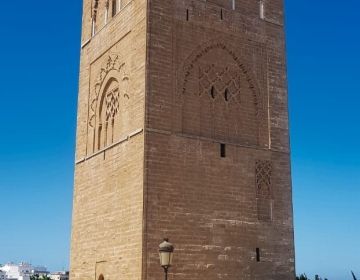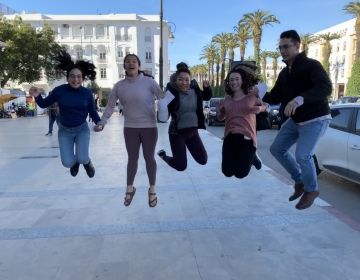Simple Nostalgia
Spending the last two weeks back in the US after my first semester in Morocco, I’ve been able to enjoy so many comforts of home that I’ve missed these last few months. That being said, this is a blog about Morocco, and God knows there are so many Moroccan comforts that I miss now that I’m back in America. Here are just a few of them:
1) Languages!
In Morocco, a normal day consisted of interactions in Darija, French, English, or some combination of the three. My eyes got used to reading signs and packages in French and Modern Standard Arabic, and my hands automatically filled out forms and wrote texts in French. Coming from that to a world where English is ubiquitous takes some of the excitement out of my everyday life. I feel as though the world has so much more than a monolingual existence and I wish that more Americans could experience what I do in Morocco.
2) Hanouts
“Hanouts” are a sort of no-frills, one stop shop store that decorate the streets of almost every city and village in Morocco. I visit them every day for telephone recharges, water (which costs the same in each and every hanout across the country), snacks, breakfast sandwiches, baking supplies, toilet paper, shampoo and conditioner, and more. More than just stores, hanouts are just one of the many places in Morocco that sit at the heart of Moroccan culture. In them, I can always find a cross section of the Moroccan population. All kinds of people - old and young, foreign and local, rich and poor – frequent them, and the owner offers a greeting and conversation with every person that passes through. The environment doesn’t feel forced, curated, capitalist, or industrial like in a Wal-mart or Target. Simply a stop on all Moroccans’ daily agendas, hanouts help remind me every day of the wonderfully grounded country that I live in and of the people that I share it with.
3) The lack of formalities
Moroccan life is not built around bureaucracies and formalities the way American life is. Instead, it operates on convenience and improvisation, which to me feels much more natural. If I wake up late one morning by accident, I can easily move a meeting with a friend or cancel a doctor’s appointment without the social repercussions or annoying cancellation fees I’d have to deal with in the US. Such schedule changes are seen more as accepted facts of life than inconveniences. Other examples are less concrete. I feel much more comfortable walking into a random store to ask for directions or ask for a service or product outside of their readily listed ones than I do here in the US.
4) Tea
Tea is as essential to Moroccans as juice cleanses are to Angelenos (actually, much much more, but you get the point). Tea, or “atay" in the Moroccan Arabic dialect, lies at the center of Moroccan society. It is a staple at meals, meetings, parties, study sessions, and any other social gathering one can think of. Morocco simply is not Morocco with tea, normally prepared with mint or verbana. Tea is always exchanged between loved ones, and is always prepared with a communitarian spirit. It brings happiness to the one drink it and the one offering it, and the warmth of that interaction is tangible. This exchange shows that in Moroccan society, happiness and profit is shared between all, and not just the one who’s directly received it, translating into a very warm and welcoming community.
5) Couscous
Couscous is my absolute FAVORITE food and my attempt to find good, authentic couscous in the US was a total failure. Nothing brings together a community of people in Morocco like couscous on Fridays does. This is epitomized in the way couscous is enjoyed. It is served in a large, round platter, with vegetables laid around the dish and meat placed in the center. The family (however we choose to define that word) sits around it and eats while facing each other, engaged in conversation. Everyone gets an equal share of couscous, vegetables, and meat, emphasizing the communitarian mindset of Morocco. Couscous takes hours to prepare, and is normally eaten after Friday prayers. The tradition allows Moroccans to take time out of the week to sit and spend time laughing and sharing with their communities. Also, even if none of the above were true, I wouldn’t care, because couscous in and of itself is so delicious.
5) My Moroccan family
When I use the word “family”, I’m writing not only about my amazing host family, but about all the Moroccans I’ve met outside of my host family who’ve become part of my chosen family in life. Never in my life, and especially not in my four years of high school, have I been surrounded by so many supportive humans who have nothing but the kindest, most selfless intentions, and who do everything in their power to make sure that I am well taken care of in all aspects of life. I owe so much to the new family I’ve found in Morocco, and being away from them, even for these couple of weeks, is very hard. I’ve been sending messages back to Morocco every single day I’ve been away and think about the country and the people in it every day. My Moroccan family has taught me what genuine warmth and acceptance looks and feels like, and I am a better and happier person for that.
Related Posts

Exploring The Unknown
It simultaneously feels like I landed yesterday, and like I’ve been living here my entire life. I guess that’s what happens while living on Moroccan time. But in reality, I’ve... keep reading
Epiphanies
Two weeks ago, CIEE Rabat hosted what we’ve dubbed amongst ourselves “the worldwide conference”—a gathering for CIEE directors around the globe, over a hundred in total. It goes without saying... keep reading

New Year, New Us
I still can’t decipher whether anxiety or excitement took center stage last Monday as I took the tram to the CIEE study center in Rabat for the first time in... keep reading
